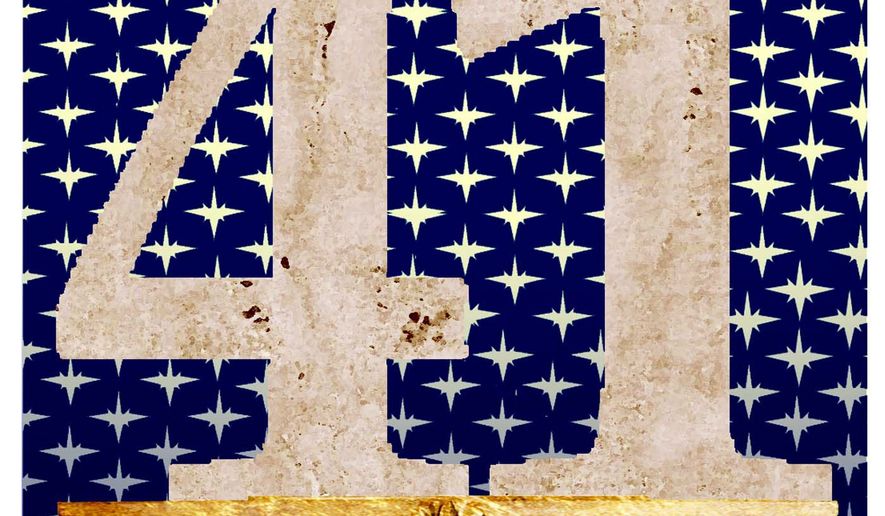OPINION:
Honor, decency, principled, character, grace, loyalty, optimistic, integrity, dignity, honesty, humble.
Those were just some of the character traits, among many others, used this week to describe former President George Herbert Walker Bush — words that you do not hear much nowadays from the nation’s capital about its leaders.
Yet that’s how his longtime friends, allies, colleagues, family, and even some of his political opponents, described Mr. Bush during two days of tributes as he lay in state in the U.S. Capitol’s Rotunda, followed by a moving, service at the Washington National Cathedral on Wednesday.
It is hard to remember a former president who has had more political experience and held more prestigious posts before climbing to the presidency in his own right:
Two-term congressman from Texas, envoy to China, head of the Central Intelligence Agency, chairman of the Republican National Committee, then the vice presidency under President Ronald Reagan for eight years, until he won the presidency in his own right by defeating Gov. Michael Dukakis of Massachusetts.
Perhaps the most emotional moment at the memorial service in the National Cathedral came when his eldest son, former President George W. Bush, spoke movingly about how his father showed him how to be president, becoming the only second father-son presidents in U.S. history since John Adams and his son, John Quincy Adams.
“Of course, dad taught me another special lesson,” the younger Bush said. “He showed me what it means to be a president who serves with integrity, leads with courage and acts with love in his heart for the citizens of our country.”
The younger Bush had sometimes talked about how the Bushes can become emotional to the point of tears, or as what he calls them, a family of “weepers.”
True to form, George W. Bush briefly broke down near the end of his eulogy as he recalled when his parents lost their daughter Robin at age 3, saying that his father is now “hugging Robin and holding mom’s hand.”
Over the course of a nearly 50-year career in the news business, I had the pleasure of interviewing George H.W. Bush two or three times in Washington.
The first, when he was in the House and I was working on a piece about the House gymnasium for United Press International. He was helpful, affable and humorous, giving me, as I recall, a few anecdotes about what goes on in the congressional gym, and how he used it to keep fit.
Some years later, when he was vice president and I was a young political reporter for UPI, who had covered the Reagan presidential campaigns, he agreed to an interview about the Reagan-Bush legislative agenda.
I had also done a lot of reporting about wasteful federal spending programs, a subject that was one of Reagan’s favorite targets during his presidency.
So much so, that the president began quoting from my book, “Fat City: How Washington Wastes Your Taxes, in his 1980 campaign, and after taking office, handed out a copy of my book to each and everyone in his Cabinet at its first meeting.
My exposes were especially popular among UPI’s newspaper clients across the country, and UPI nominated them for a Pulitzer Prize twice during my career there.
So I queried Mr. Bush during the interview about wasteful government spending, mentioning some of my findings, asking what he thought about this and that issue.
As I recall, he did not seem to warm to the issues I had raised, and didn’t appear to be as enthusiastic as President Reagan — whom I had interviewed numerous times, including two, one-on-one Oval Office meetings — was about cutting government down to size.
Then a strange thing happened soon after my interview with Mr. Bush went out over UPI’s wires. I got a phone call from his press secretary, saying the vice president was very displeased with the story. And told me he was sending a government agent over to get a copy of the interview tape.
They got their tape, but I never heard a word more from the vice president’s office after that.
But that’s all water over the dam, as they say. Later, I wrote many columns about his presidency, supporting his actions in the Gulf War and other policies, with differences here and there.
But through it all, I respected his basic decency, integrity, dignity, tough moral fiber and humility, which seems to be lacking nowadays in our nation’s leadership.
For my money, Mr. Bush was truly a class act.
• Donald Lambro is a syndicated columnist and contributor to The Washington Times.




Please read our comment policy before commenting.